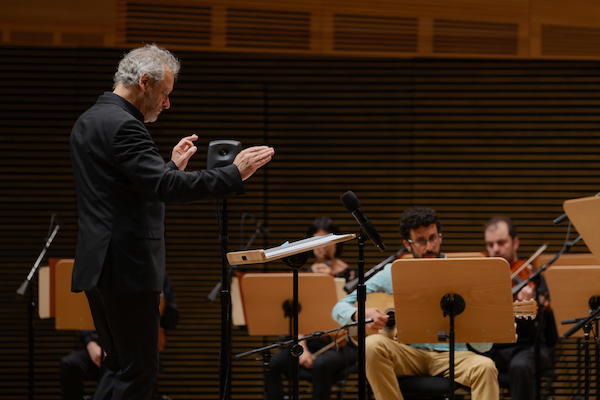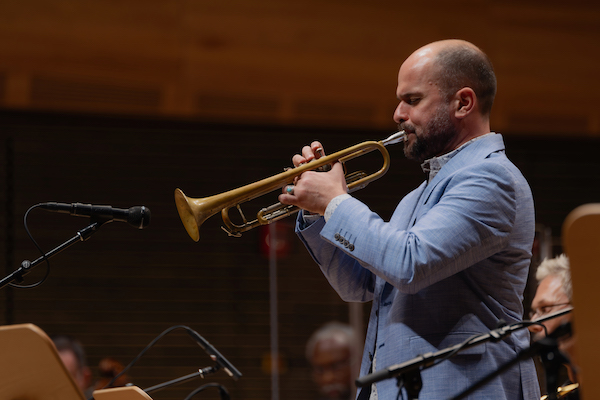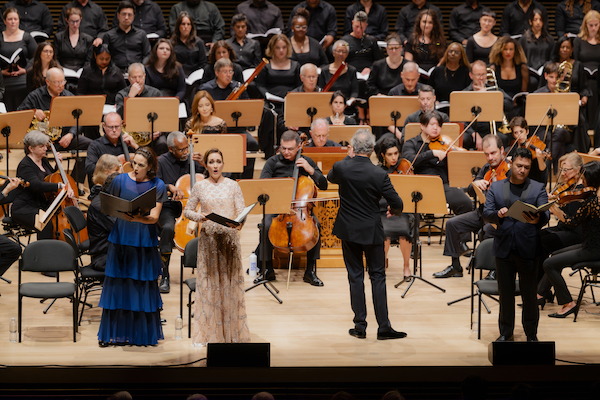A Mozart mass and Iraqi jazz dialogue in Mostly Mozart opener

Lincoln Center for the Performing Arts, Inc.—as distinct from its famous tenants, including the Met, the Philharmonic, and the NYC Ballet—was born with an identity crisis in the early 1960s, and has never quite overcome it.
But a few of its programs provide pretty good accounts of themselves, notably—for longevity at least—the Mostly Mozart Festival.
The curtain is coming down on the “little festival that could,” founded in 1968 almost as an afterthought, to keep the lights on in summer, when the aforementioned heavy hitters were absent. Presenting up-and-coming artists in a relaxed setting, giving New Yorkers a reason to stay in town, and especially riding the Mozart boom touched off by Amadeus and the 1991 bicentennial, Mostly Mozart sold a lot of tickets and T-shirts. But that was then. After pandemic shutdowns, staff layoffs, and programming re-appraisals, Lincoln Center now is hunting other game.
The first pull on the curtain rope took place Tuesday night, as the longtime music director of the Mostly Mozart Festival Orchestra, Louis Langrée, ably led his band and chorus in Mozart’s fascinating, ambitious, and incomplete Mass in C minor, K. 427, at David Geffen Hall. The festival plans to exit with flags flying—and tributes to Langrée’s 21-year tenure echoing–in a series of 6 programs bookended by this spectacular mass and the iconic trilogy of Mozart’s final symphonies, Nos. 39, 40, and 41 (“Jupiter”) on Aug. 11-12.
In the program’s other half, Langrée shouldered the modern conductor’s multicultural duty, leading some of the MMFO musicians, a jazz band, and a traditional Iraqi singer and instrumentalists in the world premiere of Dhikra (Remembrance) by Amir ElSaffar, which turned out to be something of a musical smorgasbord, rich in expressive content relating to love and loss in a war-torn world.
Mostly Mozart was never All Mozart, so it’s not shocking that a chunk of the programming multiverse Lincoln Center is now favoring invited itself to the Mozart party. In remarks from the stage, conductor Langrée and composer ElSaffar emphasized a dialogue between the old piece and the new. Finding meaning in the frailty of the human condition was certainly at the expressive center of both works. (Pointedly, ElSaffar reminded the audience that 30 million refugees from the Iraq War now roam the world.)
In fact, Mozart himself created a multicultural mélange, Italian and German, operatic and learned, Bach and Handel, in this mass. Of the several reasons suggested for why Mozart didn’t finish the work, including the occasion for it having passed and competing commissions from his patrons, perhaps the simplest was that the composer thought he couldn’t make a coherent piece from such disparate materials.
But in today’s shrinking world, stylistic fusion is in, and ElSaffar has been practicing it at least since 2006, when he founded his Iraqi jazz group Two Rivers Ensemble, which formed the core of Dhikra’s performing forces.
This information, and more about the works and the performers, were not in the printed program, because there wasn’t one. Trying to help, an usher pulled a crumpled paper from his pocket and said, “Do you want to scan the sheet they sent me?” From the stage, listeners were referred to Lincoln Center’s website. “But don’t use your phone during the concert!” cautioned Langrée. Clearly the New Way of Doing Concerts needs more work.
The world premiere was delayed briefly by Shanta Thake, Lincoln Center’s chief artistic officer, coming onstage and leading the audience in something different from the usual silence-your-phone advisory: an oddly game-show-style warmup, in which all present chanted thank-yous to “teachers, artists, neighbors,” ending with a communal shout of “Let’s go!”
It was a relief when, at last, Dhikra stole in discreetly, pianissimo, as a half dozen string and wind instruments (the Western kind), distributed around the hall, breathed a gentle drone. (Geffen Hall’s much-debated acoustic didn’t come into play, as the entire performance was expertly mixed by an uncredited sound engineer.) Composer ElSaffar proved a sensitive trumpet player, entering with soft, liquid, Arabic-inflected phrases, joined later by the expressive saxophonist Ole Mathisen and an MMFO oboist who sounded the most Arabic of all.
That is, until the entrance of vocalist Hamid Al-Saadi, a leading exponent of maqam, an ancient (and reportedly endangered) genre of Iraqi sung poetry. Al-Saadi’s bold, slightly nasal cry seemed to echo across the sea from Palestine to Spain, distilling passion and lament as few other musical sounds do. Supertitles conveyed the poems’ deep sentiments, if not their internal music: “I drink your memory, I am thirstless, renewed… In that sleep, all loved ones, kin, companions, faces, friends… Over every moving water, every sea, tell her I wait for her…”
The music settled to earth several times in an apparent close, only to begin again with a jazz riff from string bass and drums, or a solo on santur, the Iraqi hammered dulcimer. Ultimately, the piece lasted over an hour, with a listener’s interest revived, section by section, by ElSaffar’s ingenuity in tone-mixing of Western and Middle Eastern instruments (the latter also including oud and buzuq, two types of lute). The piece’s super-pianissimo ending was followed by enthusiastic, prolonged applause.
The tall maestro led the Mozart mass standing among his players without a podium, a baton, or even a score of the piece. His taut, clear gestures often rose and fell in stages, as if mirroring the terraced Baroque style Mozart was emulating in movements such as the anxious “Kyrie,” the rumbustious and Handelian “Gloria,” and the stalwart “Qui tollis.”
Langrée and his players were also alert to the operatic character of the vocal solos, matching mezzo-soprano Kate Lindsey wink for wink in a downright coquettish “Laudamus te,” and bathing Erin Morley’s agile, molten soprano in glowing woodwinds and cushioning strings in “Incarnatus est.” Quite different in timbre during their solos, the two singers adapted and matched voices prettily in the ensembles, supported by the firm, woody-toned tenor of Nicholas Phan and the reliable bass of Jonathon Adams.
The chorus, though variously billed as the Mostly Mozart Festival Chorus and the Summer for the City Chorus, suffered no confusion as to how to sing, thanks to exacting preparation by its director, Malcolm J. Merriweather. For energy and breath support, accuracy of pitch, clear articulation in fast passages, and variety of tone color, the group added luster to its name, whatever that is.
The program will be repeated tonight at 7:30 p.m.


Posted Jul 26, 2023 at 11:25 pm by jlc100023
The key phrase here is “Lasted over an hour.” No living composer can hold an attention span for so long a time. After about 30 minutes the audience was ready for an ending.
But Langree and his orchestra were wonderful and he will surely be missed,